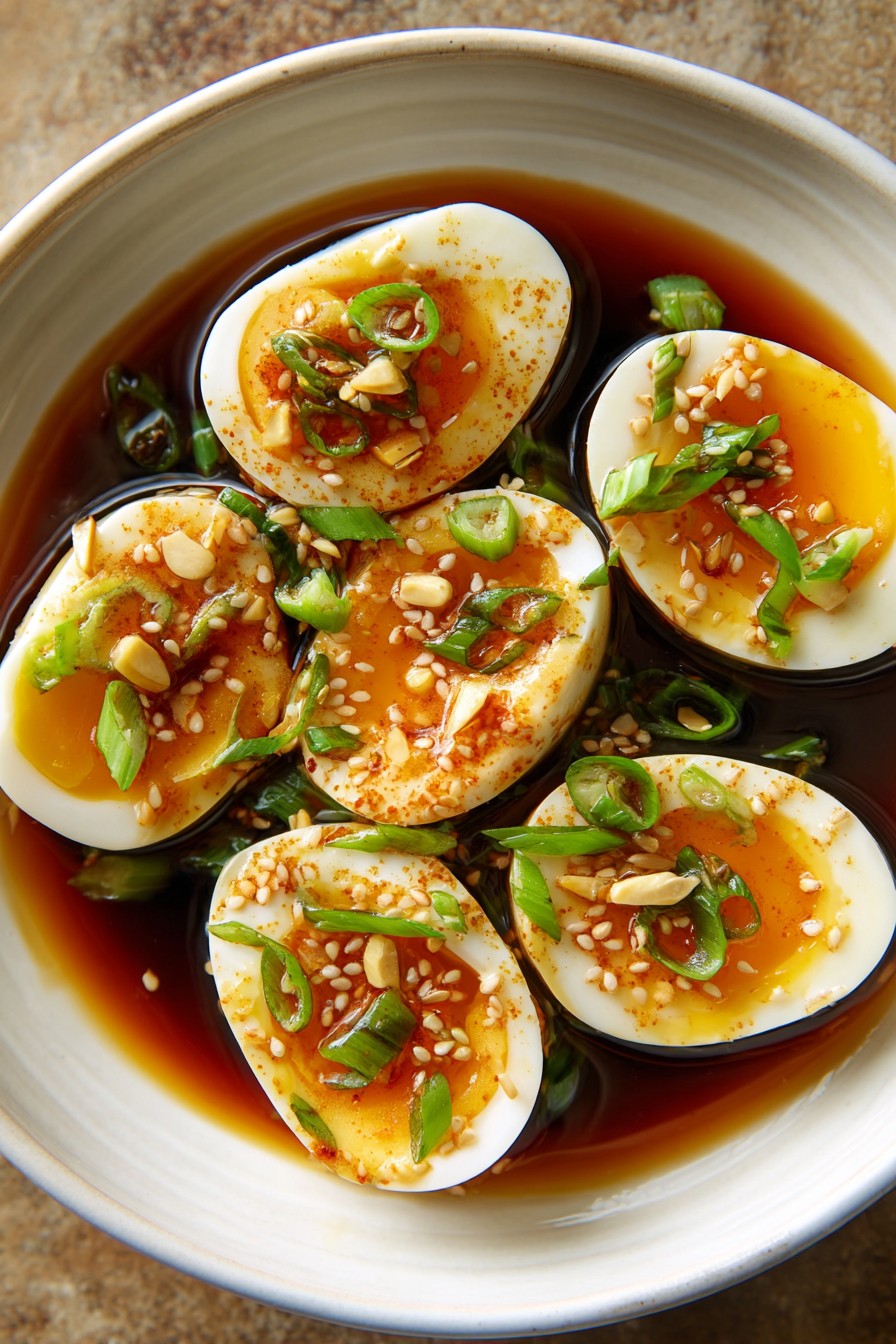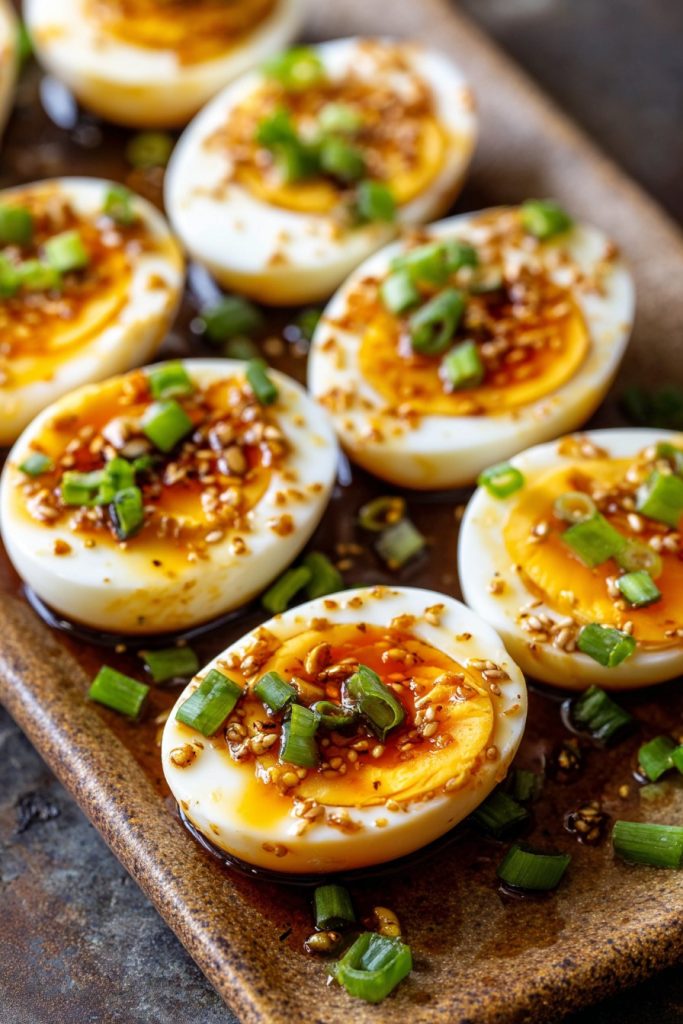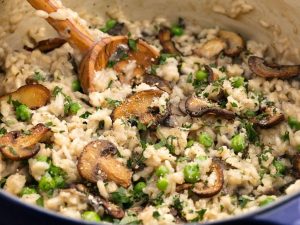These Korean marinated eggs, known as Mayak Gyeran, transform simple hard-boiled eggs into an umami-rich delicacy that’s perfect for meal prep. They’re marinated in a savory-sweet soy-based brine that penetrates deep into the whites, creating an addictive flavor profile that pairs beautifully with rice bowls, salads, or enjoyed as a high-protein snack.
Why This Recipe Works
- The balanced marinade combines soy sauce’s umami depth with mirin’s subtle sweetness and sesame oil’s nutty richness, creating a complex flavor profile that transforms ordinary eggs into an extraordinary culinary experience. This combination not only enhances taste but also provides essential amino acids and healthy fats that support muscle repair and sustained energy levels throughout your day.
- Proper boiling technique ensures yolks remain creamy without becoming chalky or dry, preserving the egg’s natural nutritional benefits including choline for brain health and lutein for eye protection. The precise cooking method maintains the integrity of the protein structure while making the eggs easier to digest and absorb.
- Marinating for the optimal 12-24 hour window allows flavors to penetrate deeply while preventing the eggs from becoming overly salty or tough, striking the perfect balance between flavor infusion and texture preservation. This timing ensures maximum nutrient retention while developing the characteristic savory quality that makes these eggs so addictive.
- Using fresh aromatics like garlic and green onions introduces antioxidant compounds and anti-inflammatory properties that complement the eggs’ nutritional profile while adding layers of flavor complexity. These ingredients work synergistically to support immune function and provide additional micronutrients that enhance the overall health benefits of this simple dish.
Ingredients
- 6 large eggs, preferably pasture-raised for optimal nutrient density
- 1/2 cup soy sauce (use reduced-sodium if preferred)
- 1/4 cup mirin (Japanese sweet rice wine)
- 2 tablespoons rice vinegar
- 1 tablespoon sesame oil
- 2 tablespoons granulated sugar or honey
- 3 cloves garlic, thinly sliced
- 2 green onions, thinly sliced
- 1 tablespoon sesame seeds, toasted
- 1/2 cup water
Equipment Needed
- Medium saucepan with lid
- Slotted spoon or spider strainer
- Ice bath bowl
- 1-quart mason jar or airtight container
- Cutting board and sharp knife
- Measuring cups and spoons
- Small saucepan for marinade
Instructions

Prepare the Eggs with Precision Cooking
Begin by placing your eggs in a single layer at the bottom of your medium saucepan, ensuring they’re not crowded to promote even cooking. Cover the eggs with cold water until they’re submerged by about one inch—this gradual temperature increase helps prevent cracking and ensures uniform doneness throughout each egg. Bring the water to a rolling boil over high heat, then immediately remove the pan from heat, cover with the lid, and let stand for exactly 9 minutes. This precise timing creates perfectly cooked eggs with fully set whites and creamy, bright yellow yolks that maintain their nutritional integrity without becoming dry or chalky. While the eggs rest, prepare an ice bath by filling a large bowl with cold water and ice cubes to rapidly stop the cooking process.
Create the Flavorful Marinade Base
While the eggs are cooking, combine the soy sauce, mirin, rice vinegar, sesame oil, sugar or honey, and water in your small saucepan over medium heat. Stir continuously until the sugar completely dissolves and the mixture becomes homogeneous, which should take about 2-3 minutes of constant stirring. The gentle heating helps the flavors meld together while preserving the delicate compounds in each ingredient. Once dissolved, remove the marinade from heat and allow it to cool slightly before adding the sliced garlic and green onions—adding them while the liquid is still warm helps release their aromatic oils without cooking them thoroughly. This step is crucial for developing the complex flavor profile that makes these marinated eggs so distinctive and nutritionally beneficial.
Peel and Prepare Eggs for Marinating
After the eggs have rested for their designated 9 minutes, carefully transfer them using your slotted spoon to the prepared ice bath. Let them chill for at least 10-15 minutes until completely cool to the touch—this temperature shock contracts the egg inside the shell, creating an air pocket that makes peeling significantly easier. Gently tap each egg on a hard surface and roll between your palms to crackle the shell uniformly, then peel under cool running water to help separate the membrane from the egg white. Inspect each peeled egg for any remaining shell fragments and pat them dry with a paper towel to ensure the marinade adheres properly. Proper peeling technique preserves the smooth surface of the egg whites, allowing for optimal marinade absorption and presentation.
Combine Eggs with Marinade in Container
Place your perfectly peeled eggs into your clean 1-quart mason jar or airtight container, arranging them carefully to maximize space without overcrowding. Slowly pour the prepared marinade over the eggs, ensuring they’re completely submerged—if needed, add a bit more water to cover them entirely. The marinade should reach about half an inch above the top egg to guarantee even flavor distribution. Gently tap the container on the countertop to release any air bubbles that might prevent the liquid from contacting all surfaces of the eggs. Sprinkle the toasted sesame seeds over the top before sealing the container, as they’ll gradually infuse their nutty flavor throughout the marinade while adding beneficial minerals like calcium and magnesium to the final product.
Marinate and Monitor for Optimal Flavor Development
Seal your container tightly and refrigerate for a minimum of 12 hours, with the ideal marinating window being between 12-24 hours for perfect flavor penetration without becoming overly salty. During this time, gently rotate the container every 4-6 hours to ensure all sides of the eggs receive equal exposure to the marinade—this simple step dramatically improves flavor consistency. After 12 hours, you can sample one egg to assess the flavor development; the whites should have taken on a beautiful caramel color and the flavor should be savory with balanced sweetness. For deeper flavor, continue marinating up to 48 hours, though beyond this point the texture may begin to firm excessively. The gradual marinating process allows the proteins in the egg whites to slowly absorb the complex flavors while maintaining their nutritional profile.
Tips and Tricks
For those seeking to maximize both flavor and nutritional benefits, consider using pasture-raised eggs whenever possible, as they typically contain higher levels of omega-3 fatty acids and vitamins A and E compared to conventional eggs. The richer yolk color also creates a more visually appealing final product. When preparing your marinade, toasting the sesame seeds before adding them releases their natural oils and enhances their nutty flavor profile while making their nutrients more bioavailable. Simply place them in a dry skillet over medium heat for 2-3 minutes until fragrant and lightly golden, shaking the pan frequently to prevent burning.
If you prefer a less salty final product, you can reduce the soy sauce to 1/3 cup and increase the water to 2/3 cup—this modification still provides ample flavor while lowering the sodium content significantly. For those monitoring sugar intake, substitute the granulated sugar with monk fruit sweetener or stevia, though you may need to adjust the quantity based on your preferred sweetness level. When storing your marinated eggs, always use a glass container rather than plastic, as the soy-based marinade can absorb plastic flavors over time and glass prevents this chemical interaction while being better for food safety.
The marinade liquid can be reused for a second batch of eggs within 3-4 days, though the flavor will be slightly less intense with each subsequent use. You can also use the leftover marinade as a seasoning for rice bowls or stir-fries, adding an extra layer of umami to other dishes. For optimal food safety, always ensure your eggs remain fully submerged in the marinade and consume within 5-7 days, discarding any that develop an off odor or appearance. If you notice the marinade becoming cloudy, this is typically normal due to protein extraction from the eggs, but if it develops an unusual smell, it’s best to discard the entire batch.
For meal prep efficiency, consider making a double batch of the marinade and storing it separately in the refrigerator for up to two weeks—this allows you to quickly marinate fresh eggs without preparing the liquid each time. When serving, bring the eggs to room temperature for about 15 minutes before eating to enhance their flavor profile, as cold temperatures can mute some of the more subtle notes in the marinade. For presentation, slice the eggs in half lengthwise to showcase the beautiful gradient from the deeply colored exterior to the bright yellow yolk, creating an impressive visual element for any meal.
Recipe Variations
- Spicy Korean Marinated Eggs: Add 1-2 tablespoons of gochujang (Korean chili paste) and 1 teaspoon of gochugaru (Korean chili flakes) to the marinade for a pleasantly spicy kick. The capsaicin in the chili peppers provides metabolism-boosting benefits while adding anti-inflammatory properties. This variation creates a more complex flavor profile that balances heat with the existing savory-sweet notes, perfect for those who enjoy bolder flavors. The gentle heat also stimulates circulation and can temporarily boost metabolic rate, adding another dimension to the nutritional benefits.
- Herb-Infused Marinated Eggs: Incorporate 2-3 sprigs of fresh thyme, 1 bay leaf, and 1 teaspoon of black peppercorns into the marinade for an aromatic twist. The herbs introduce additional antioxidants and phytochemicals that support digestive health and provide anti-inflammatory benefits. This European-inspired variation creates a more complex botanical profile while maintaining the essential umami character of the original recipe. The herbs also contribute minimal calories while significantly enhancing the nutritional density through their diverse array of beneficial compounds.
- Citrus-Ginger Marinated Eggs: Add 2 tablespoons of freshly squeezed orange juice, 1 tablespoon of orange zest, and 1 tablespoon of freshly grated ginger to the marinade base. The citrus provides vitamin C to enhance iron absorption from the eggs, while ginger offers digestive benefits and anti-inflammatory properties. This bright, refreshing variation works particularly well for summer months or when serving the eggs as part of a lighter meal. The combination also introduces additional enzymes that can aid in protein digestion, making the eggs even more bioavailable.
- Smoky Maple Marinated Eggs: Replace the sugar with 2 tablespoons of pure maple syrup and add 1 teaspoon of smoked paprika to the marinade mixture. Maple syrup contains beneficial antioxidants and minerals like zinc and manganese, while smoked paprika provides a depth of flavor without adding significant heat. This variation creates a more robust, autumnal flavor profile that pairs exceptionally well with whole grain dishes and roasted vegetables. The natural sweetness of maple syrup also has a lower glycemic impact than refined sugar, making this suitable for those monitoring blood sugar levels.
Frequently Asked Questions
Can I use soft-boiled eggs instead of hard-boiled for this recipe?
While soft-boiled eggs can be used, they require significant adjustments to achieve optimal results. The delicate whites of soft-boiled eggs absorb marinade much more quickly, potentially becoming overly salty within just 4-6 hours instead of the recommended 12-24. Additionally, the runny yolk, while delicious, doesn’t absorb flavors in the same way and can create textural challenges when eating. If you prefer soft-boiled eggs, reduce the marinating time to 4-8 hours maximum and consider increasing the water content in your marinade to dilute the saltiness. Nutritionally, soft-boiled eggs maintain more heat-sensitive nutrients like certain B vitamins, but they also have a shorter shelf life once marinated.
How long do Korean marinated eggs last in the refrigerator?
Properly stored in an airtight container with the eggs fully submerged in marinade, Korean marinated eggs will maintain optimal quality for 5-7 days in the refrigerator. The high salt content in the soy sauce creates an environment that inhibits bacterial growth, but the eggs will continue to absorb salt over time, eventually becoming too salty if left beyond one week. For food safety, always store below 40°F and discard if you notice any off odors, sliminess, or significant changes in appearance. The marinade itself can be reused within 3-4 days for a second batch, though the flavor intensity will diminish with each use.
What are the health benefits of regularly eating marinated eggs?
Korean marinated eggs offer numerous health benefits beyond those of plain hard-boiled eggs. The eggs themselves provide high-quality complete protein containing all essential amino acids necessary for muscle repair and maintenance, along with choline for brain health and lutein for eye protection. The marinade ingredients contribute additional benefits: soy sauce contains antioxidants and minerals, sesame oil provides heart-healthy monounsaturated fats, and garlic offers allicin with potential cardiovascular benefits. When consumed as part of a balanced diet, these marinated eggs can support satiety, provide sustained energy, and deliver a diverse array of micronutrients that support overall health and wellbeing.
Can I make this recipe vegan or with egg alternatives?
While traditional Korean marinated eggs rely on the unique protein structure of real eggs, you can create a plant-based version using firm tofu or boiled potatoes. For tofu, press excess water from one 14-ounce block of extra-firm tofu, then cut into 1-inch thick slices before marinating using the same method and timing. The tofu will absorb the flavors beautifully while providing plant-based protein and isoflavones. For potatoes, boil small Yukon Gold potatoes until tender but not falling apart, then peel and marinate similarly. Both alternatives offer different nutritional profiles—tofu provides complete plant protein while potatoes offer resistant starch and potassium—but neither replicates the exact texture of marinated eggs.
Summary
Korean marinated eggs transform simple ingredients into a nutritionally dense, flavor-packed staple perfect for meal prep. The balanced marinade penetrates deeply while preserving the eggs’ protein quality and beneficial nutrients. With multiple variations and serving suggestions, this versatile dish supports healthy eating goals through its combination of high-quality protein, healthy fats, and antioxidant-rich ingredients.
Korean Marinated Eggs (Mayak Gyeran)
6
servings15
minutes15
minutesIngredients
Instructions
- 1 Place eggs in saucepan, cover with 1 inch cold water. Bring to boil, then remove from heat, cover, and let stand 9 minutes.
- 2 Transfer eggs to ice bath for 10-15 minutes until completely cool.
- 3 Combine soy sauce, mirin, vinegar, sesame oil, sugar, and water in saucepan. Heat until sugar dissolves, then cool slightly.
- 4 Add garlic and green onions to marinade mixture.
- 5 Peel cooled eggs and place in container. Pour marinade over eggs, ensuring full coverage.
- 6 Refrigerate 12-24 hours, rotating container occasionally for even marinating.



